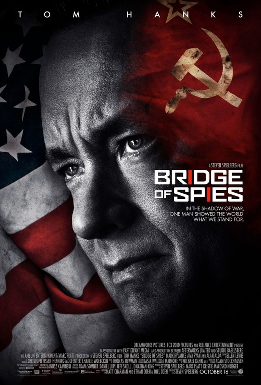If you need someone to play a noble everyman, you need Tom Hanks. If you need someone to write a movie that features a lot of legalese and double talk, you need the Coen Brothers. And if you need a director to pull it all together, you often need Steven Spielberg. So why, despite several great scenes, does Bridge of Spies feel less than the sum of its stellar parts? Well, that's because, aside from one plane crash, there's very little excitement in this film. Like Lincoln, it's a lot more about the back-door political work that has to take place for the right thing to get done.
Tom Hanks is his usual tremendous self, playing insurance lawyer James Donovan, who's tasked with defending a suspected Soviet spy Rudolf Abel (Mark Rylance, in a performance I hope gets some Oscar buzz). But his defense is a little too passionate. It may be clear what he's done, but Donovan, rule-follower that he is, wants to make sure the prosecutors prove it just as they would have to were he suspected of any other crime.
Ostracized from his colleagues and threatened by neighbors for defending a "traitor" "“ though as he points out in one of many great dialogue exchanges: it's technically impossible for Abel to be a traitor to the U.S. since he's not even a U.S. citizen "“ Donovan is tapped by the CIA to help negotiate a prisoner exchange: Abel for American pilot Francis Gary Powers (Austin Stowell).
Complicating things is that Donovan also catches wind of an American economics student Frederic Pryor (Will Rogers) trapped in East Berlin. A shady lawyer (Sebastian Koch) wants to help Donovan and Pryor but for his own purposes. And so Donovan has to carry the burden of doing what's right even as the odds are stacked against him.
Bridge of Spies has a lot of talk about spy craft, but an espionage thriller it is not. The dialogue often pops "“ I'd expect nothing less from the Coen Brothers "“ but it just shows how much the film needs to be propped up. At times, it really is that dull. Still, it's a satisfying film about a real American hero whose story cannot be told enough.

